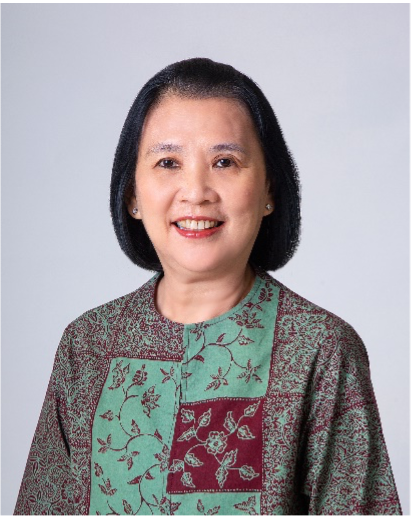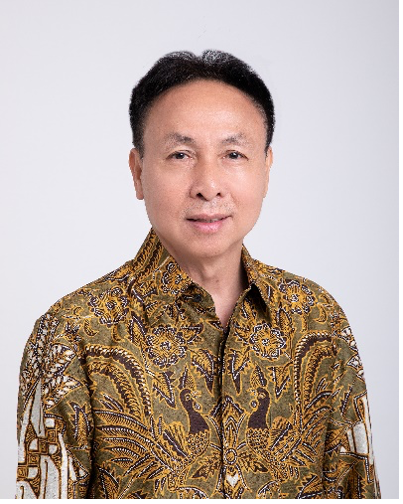BOARD OF COMISSIONER’S SUPPORTING ORGAN
Audit Committee
Basis of Audit Committee’s establishment
The Audit Committee is a committee established by the BoC to support the performance of BoC’s duties and functions in accordance with OJK Regulation No. 55/POJK.04/2015 of December 23, 2015 on the Formation and Implementation Guidelines for Audit Committee (“POJK 55”).
Audit Committee Charter
The Audit Committee has the Audit Committee Charter as the guideline for carrying out duties and responsibilities. The Audit Committee Charter was last updated / refined in 2021. The Audit Committee Charter is available on the hyperlink attached click here .
Audit Committee’s duties and responsibilities
The Audit Committee is committed to complying with the Audit Committee Charter in carrying out their duties and functions in such a manner that consistently supports the BoC in accordance with the principles of Good Corporate Governance (GCG) and the applicable rules and regulations.
As stipulated in the renewed Audit Committee Charter, the Audit Committee’s duties and responsibilities include:
- review of AEI’ financial information;
- dismissal and recommendation for the appointment of independent auditor and monitoring of their performance;
- review of Internal Audit Division’s audit results;
- internal control effectiveness;
- monitoring of AEI’s compliance with rules and regulations; and
- evaluation on the implementation of risk management.
Independency Statement
To maintain the independency, every member of the Audit Committee must fulfill the independency requirements as stipulated in the Audit Committee Charter, as follows:
- not an insider party to the Public Accounting Firm, Legal Consulting Firm, Public Appraiser Firm, or other parties which provide assurance services, appraisal services and/or other consultation services to the company within the last 6 (six) months.
- not a party working for or having the authority and responsibility to plan, lead, control, or supervise the company’s activities within the last 6 (six) months, except for the Independent Commissioners.
- not holding the company’s shares directly or indirectly. In the event that a member of Audit Committee receives the company’s shares directly or indirectly due to a legal event, the shares must be transferred to other parties at the latest within 6 (six) months after the shares are received.
- not having an affiliated relationship with any member of BoC, BoD, or major shareholders of the company.
- not having any business relationship which is directly or indirectly related to the company’s business activities.
- in the event that an Independent Commissioner is a member of the Audit Committee, such Independent Commissioner may only be reappointed to be a member of the Audit Committee for 1 (one) subsequent term of office.
- an Independent Commissioner who holds the position as the Audit Committee Chairperson may only hold a position as a chairperson at 1 (one) other committee.
The profiles of the Audit Committee’s chairman and members
Mohammad Effendi was appointed to be the Company’s Audit Committee Chairman based on the Board of Commissioners’ Decree of May 27th, 2019. More information on his qualifications is presented in the Board of Commissioners’ profiles.

|
Citizenship |
Indonesia |
|
Age |
61 years old as at December 31, 2023 |
|
Domicile |
Special Capital Region of Jakarta, Indonesia |
|
Education |
|
|
Work experience |
|

|
Citizenship |
Indonesia |
|
Age |
67 years old as at December 31, 2023 |
|
Domicile |
Tangerang Selatan, Banten Province, Indonesia |
|
Education |
|
|
Work experience |
|
Remuneration and Nomination Function
The BoC has decided that the function of nomination and remuneration for the BoC and BoD shall be carried out by the BoC without establishing a committee of nomination and remuneration.
In the implementation, the BoC shall act independently by referring to the Guideline for the Nomination and Remuneration Function, which determines the associated duties and responsibilities of the BoC.
The roles carried out concerning nomination:
- determine the policy on the BoC’s and BoD’s compositions, criteria for the nomination process, and performance evaluation of the members of the BoC and BoD;
- assess the BoC’s and BoD’s performance based on the policies;
- determine the policies on the skill development program for BoC and BoD; and
- determine the candidates of the BoC and BoD members to be proposed to the GMS.
The roles carried out concerning remuneration:
- determine the policies on the remuneration structure, policies, and amount; and
- assess the BoC’s and BoD’s performance by referring to the remuneration received.
The complete guideline for the Nomination and Remuneration Function is provided at click here
BOARD OF DIRECTOR’S COMMITTEE AND SUPPORTING ORGAN
Sustainability Management Committee
The Company has Sustainability Management Committee, which is tasked to support the implementation of the BoD’s duties.
In 2023, the Sustainability Management Committee coordinated and supervised the development of NZE Statement, created the roadmap of carbon emission reduction and energy, reviewed recent ESG trends, studied the latest sustainability reporting framework, and supervised and reviewed the Sustainability Report
HSE Steering Committee
The Adaro Group has the following management standards as HSE management guidelines for the subsidiaries:
- Adaro OHS Management Standard
- Adaro Environmental Management Standards
- Adaro Energy Management Standard
In 2023, the Company added two technical guidelines: Pedoman Teknis Survei Tingkat Kematangan Keselamatan Kerja (Safety Maturity Level) dan Pedoman Teknis Pengelolaan Ergonomi, and revised several technical guidelines for IHOH and environmental aspects, namely:
- Technical Guideline for IHOH Standard
- Technical Guideline for Health Risk Assessment (HRA)
- Technical Guideline for IHOH Program
- Technical Guideline for Managing Work-related Health Problems
- Technical Guideline for Medical Emergency Response Plans
- Technical Guideline for Managing Fit to Work and Return to Work (RTW)
- Technical Guideline for Handling of Hazardous Materials
WBS Committee
WBS Committee is a committee formed with the scope of Adaro Group-wide, with members appointed by AEI’s Board of Directors. This committee was designed to receive, review, and follow up on (internally or externally) complaints from whistleblowers, whose identity would be kept confidential.
Corporate Secretary
As a public company, PT Adaro Energy Indonesia Tbk (AEI) is required to have a Corporate Secretary function in accordance with the provision of the Financial Services Authority (OJK) Regulation No. 35/POJK.04/2014 on Corporate Secretary of Issuers or Public Companies. The Corporate Secretary has the duties and responsibilities to facilitate the communication among the company’s organs, plan and develop corporate governance policies, and ensure the company's effective communications with external individuals and institutions, including investors and other market participants, while taking account of the company’s code of conduct, governance principles, and values.
The Corporate Secretary reports to the Board of Directors and is appointed and dismissed by a BoD Decree. The appointment of the Corporate Secretary is a component of the GCG implementation. The Corporate Secretary is not allowed to hold any position at any other issuer or public company.
BOARD OF DIRECTOR’S SUPPORTING ORGAN

|
Citizenship |
Indonesia |
|
Age |
45 as at December 31st, 2023 |
|
Education |
|
|
Career history |
|
|
Legal basis of appointment |
Direct appointment by the BoD on September 1st, 2014 |
|
Works Experience |
|
In 2023, the Corporate Secretary fulfilled the duties and responsibilities by:
- presenting regular reports and information disclosures to the FSA and IDX in compliance with capital market rules and regulations;
- supporting the BoD in conducting AGMS, EGMS, and Annual Public Expose;
- overseeing the company’s shareholders registration and reporting the adjustments to the BoD and regulators;
- providing updates to the BoC and BoD on the company’s shares and other capital market matters;
- together with the Internal Audit Division, promoting GCG implementation in the company and identifies governance risks, including the company’s reputation risk;
- maintaining effective communications with the stakeholders, in particular with capital market regulatory bodies;
- ensuring that the company’s website is always updated and in compliance with capital market rules and regulations; and
developing and proposing the work plans, budget and performance indicators of Corporate Secretary Division to the relevant director.
Internal Audit
The Internal Audit Function has carried out its duties in accordance with the Internal Audit Charter. The Board of Directors has given its full support to the internal audit activities and there were no restrictions on the scope and access for the Internal Audit Function.
In addition to complying with the Adaro Values and the Adaro Group’s Code of Conduct, the Internal Audit Function also adopts the Code of Conduct for internal audit profession issued by IIA. Each AEI’s internal auditor must read and understand the Code of Conduct
The Internal Audit Function plays the role to provide an objective and independent assurance and consultancy services for AEI and its subsidiaries in the areas of governance, risk management and control, to add value and improve the company’s operations.
For the full Internal Audit Charter, please click here.
|
Citizenship |
Indonesia |
|
Age |
44 as at December 31st, 2023 |
|
Education |
|
|
Career history |
|
|
Legal basis of appointment |
BoD’s Decree of August 4th, 2022 |
|
Work Experience |
|
Duties and responsibilities
The Internal Audit Function’s duties and responsibilities, among others, include the following:
- develop flexible annual risk-based internal audit plans;
- implement the annual internal audit plans and conduct special audits whenever necessary;
- test and evaluate the implementation of internal control and risk management systems in accordance with company policies and applicable regulations;
- examine and assess the efficiency and effectiveness in all aspects, including finance, accounting, operations, human resources, marketing, information technology, and other activities;
- provide suggestions for improvement and objective information about the relevant activities examined at all levels of management;
- prepare an audit report and submit the report to the BoD, BoC, and the Audit Committee;
- monitor, analyze and report the implementation of the improvement actions recommended;
- collaborate with the Audit Committee;
- develop and implement the assurance and quality improvement program to evaluate the activities of the Internal Audit Function; and
coordinate with other assurance functions (such as Health Safety & Environment, Legal and Compliance, Risk Management, external auditor) to optimize the assurance on the process of governance, risk management, and control of the company.
Structure and position
The Internal Audit Function is independent and reports directly to the President Director. To maintain objectivity, internal auditors are not allowed to have duties and positions concurrent with the implementer of the operational activities of the company and subsidiaries.
In addition, internal auditors must sign the Statement of Conflict of Interest every year to ensure that they have no potential of conflict of interest in carrying out duties and responsibilities, and if there is any conflict of interest, the company will take the necessary measures to overcome the associated risk of conflict of interest.
Internal Audit Practices
The internal audit practices are carried out by referring to the International Standards for the Professional Practice of Internal Auditing issued by the Institute of Internal Auditors (IIA). The standards of internal audit works have been formalized into a Standard Operating Procedure of Internal Audit.
Use of Information Technology
To facilitate its activity, the Internal Audit function has been using information technology as needed, such as for working papers, internal audit portal for knowledge management, timesheets, corrective actions data base, and data analytics tools software.
Assurance Program and Quality Improvement
To ensure continuous improvement of its audit quality, the Internal Audit Function implements a quality assurance and improvement program that comprises:
- conducting surveys to obtain feedback from the management;
- performing self-assessment and peer review for each audit assignment to ensure compliance with the existing Internal Audit manual; and
- conducting self-assessment on the compliance with FSA regulations and conformance with IIA Standards.
The result of quality assurance and improvement program is compiled and discussed every year to be included in our continuous improvement project for the following year. The quality assurance and improvement program has been performed regularly and produced positive results. The outcomes are reported to the Board of Directors and the Audit Committee on a regular basis.
Investor Relation
Investor Relations
The Investor Relations is responsible for building communications between the company and the shareholders at both local and international levels, by sharing the company’s business and financial performance, as well as corporate achievements. The information is expected to help analysts in building stories about the company and the investors in making investment decisions. The company believes that ongoing dialogues with the shareholders based on fact and transparency will create maximum shareholder value.
To ensure that the company’s messages and performance are well-communicated, Investor Relations releases several reports, such as the quarterly press releases, financial statements, financial press releases, and disclosure reports. Investor relations also communicate through several events, such as investor presentations, the public exposes, and the regular meetings with analysts and investors.
ESG
Environmental, Social, and Governance
AEI is committed to continuously strengthening the Environmental, Social, and Governance (“ESG”) in each operational activity to maintain the practice of a good mining company and support the environmentally-friendly principles. One of the steps made to support this is the establishment of a division dedicated to ESG.
The ESG Division has the duties of formulating ESG planning and implementation plans, developing ESG policies and evaluating the comprehensive implementation of ESG programs, and identifying improvement opportunities. The ESG Division is also positioned as the coordinator for the associated divisions in implementing and improving AEI’s ESG performance. In line with the establishment of one of its pillars of growth, Adaro Green, AEI will focus on developing the plans to support the reduction of carbon emission and developing various new and renewable energy sources.
*This division is led by Mahardika Putranto, who reports directly to the Director.*
